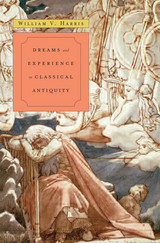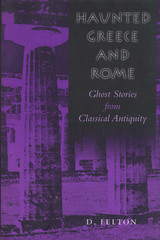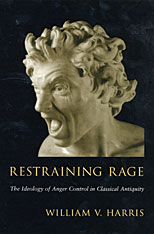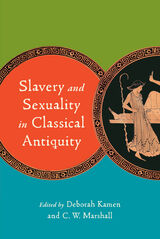
Long regarded as copies of lost Greek masterpieces, a great many Roman works are now seen as neoclassical images worthy of analysis within their own Roman contexts. This book identifies and takes account of Roman criteria in rethinking the function and aesthetic appeal of these works in the eyes of their Roman owners and audiences. Collectively, the essays argue that many traditional assumptions about the status of works of classical art as originals or copies, and much of the evidence that has been used to sustain these assumptions, must be thoroughly rethought.
Among the authors are classical archaeologists, art historians (whose areas of expertise range from antiquity to the nineteenth century), and a contemporary artist and critic.
Elaine K. Gazda is Professor in the Department of the History of Art and the Interdepartmental Program in Classical Art and Archaeology, University of Michigan.

From the Iliad to Aristophanes, from the gospel of Matthew to Augustine, Greek and Latin texts are constellated with descriptive images of dreams. Some are formulaic, others intensely vivid. The best ancient minds—Plato, Aristotle, the physician Galen, and others—struggled to understand the meaning of dreams.
With Dreams and Experience in Classical Antiquity the renowned ancient historian William Harris turns his attention to oneiric matters. This cultural history of dreams in antiquity draws on both contemporary post-Freudian science and careful critiques of the ancient texts. Harris traces the history of characteristic forms of dream-description and relates them both to the ancient experience of dreaming and to literary and religious imperatives. He analyzes the nuances of Greek and Roman belief in the truth-telling potential of dreams, and in a final chapter offers an assessment of ancient attempts to understand dreams naturalistically.
How did dreaming culture evolve from Homer’s time to late antiquity? What did these dreams signify? And how do we read and understand ancient dreams through modern eyes? Harris takes an elusive subject and writes about it with rigor and precision, reminding us of specificities, contexts, and changing attitudes through history.

Stories of ghostly spirits who return to this world to warn of danger, to prophesy, to take revenge, to request proper burial, or to comfort the living fascinated people in ancient times just as they do today. In this innovative, interdisciplinary study, the author combines a modern folkloric perspective with literary analysis of ghost stories from classical antiquity to shed new light on the stories' folk roots.
The author begins by examining ancient Greek and Roman beliefs about death and the departed and the various kinds of ghost stories which arose from these beliefs. She then focuses on the longer stories of Plautus, Pliny, and Lucian, which concern haunted houses. Her analysis illuminates the oral and literary transmission and adaptation of folkloric motifs and the development of the ghost story as a literary form. In her concluding chapter, the author also traces the influence of ancient ghost stories on modern ghost story writers, a topic that will interest all readers and scholars of tales of hauntings.

The angry emotions, and the problems they presented, were an ancient Greek preoccupation from Homer to late antiquity. From the first lines of the Iliad to the church fathers of the fourth century A.D., the control or elimination of rage was an obsessive concern. From the Greek world it passed to the Romans.
Drawing on a wide range of ancient texts, and on recent work in anthropology and psychology, Restraining Rage explains the rise and persistence of this concern. W. V. Harris shows that the discourse of anger-control was of crucial importance in several different spheres, in politics--both republican and monarchical--in the family, and in the slave economy. He suggests that it played a special role in maintaining male domination over women. He explores the working out of these themes in Attic tragedy, in the great Greek historians, in Aristotle and the Hellenistic philosophers, and in many other kinds of texts.
From the time of Plato onward, educated Greeks developed a strong conscious interest in their own psychic health. Emotional control was part of this. Harris offers a new theory to explain this interest, and a history of the anger-therapy that derived from it. He ends by suggesting some contemporary lessons that can be drawn from the Greek and Roman experience.

Slavery and Sexuality in Classical Antiquity reveals the often hidden and contradictory attitudes concerning the sexual identities and expression of enslaved people. These individuals were typically objectified by both social convention and legal description but were also recognized as human subjects, with subjectivity and sexual desires of their own. The contributors provoke valuable and fascinating questions that not only recognize the trauma and struggles of enslaved people but also point to the apparent inconsistencies in the mindsets of the enslavers. The resulting volume expands our understanding of both sexuality and slavery in ancient Greece and Rome, as separate subjects and as they impacted each other.
READERS
Browse our collection.
PUBLISHERS
See BiblioVault's publisher services.
STUDENT SERVICES
Files for college accessibility offices.
UChicago Accessibility Resources
home | accessibility | search | about | contact us
BiblioVault ® 2001 - 2024
The University of Chicago Press









